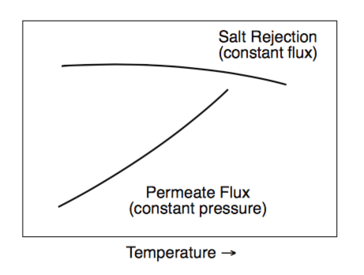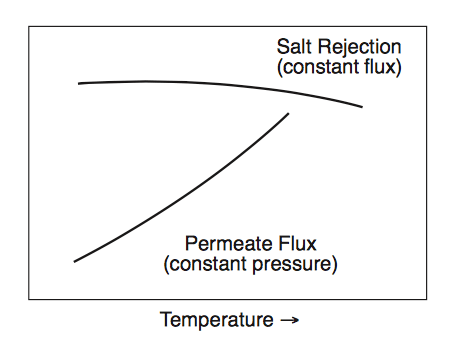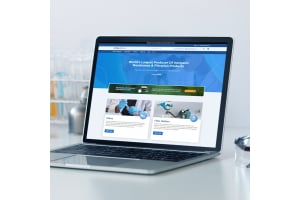How does temperature affect membrane performance?

Have you noticed how your membrane performance is affected by the operating conditions? Depending on the type of membrane separation process, operating conditions may include hydraulic pressure, osmotic pressure, temperature and feed cross flow velocity. Operating conditions can affect both permeate flux and solute rejection. Among these parameters, permeate flux is very sensitive to the feed temperature. Permeate flux increases as the feed temperature increases. This is mainly due to the decrease of feed viscosity with an increase in the feed temperature. More specifically permeate flux typically increases as temperature increases in a linear relationship with viscosity as described below (1):

In this equation, J is the permeate flux through the membrane, m is the feed viscosity, J0 is the permeate flux at a reference temperature, and μ0 is the viscosity at the same reference temperature. J₀ and µ₀ are constants and are ordinarily defined by the membrane manufacturer at a typical room temperature. The permeate flux, J, at any temperature can simply estimated by using the feed viscosity, µ, at that temperature in the equation.
Operating temperature also affects solute rejection in the membrane separations involving diffusion of molecules through the dense membrane: e.g. in reverse osmosis (RO), pervaporation and gas permeation. Increases in feed temperature result in a higher passage of solutes, e.g. salts, due to a higher diffusion rates according to the solution-diffusion model (1):

Where D is the diffusion coefficient of the solutes, C is concentration of the solutes and l is the membrane thickness.

Image adopted from: Factors Affecting RO Membrane Performance (2)
Curious to know how other operating parameters affect your membrane’s performance? Get in touch with one of our Membrane and Process Development Specialists to help you.
References:
[1] Baker, Richard W., Membrane Technology and Applications, Second Edition
[2] Factors Affecting RO Membrane Performance, Dow Chemicals, retrieved from https://msdssearch.dow.com/PublishedLiteratureDOWCOM/dh_0030/0901b80380030095.pdf
- Most Viewed Blog Articles (5)
- Company News (285)
- Emerging Technologies (64)
- Microbiology and Life Science News (93)
- Water and Fluid Separation News (97)
- Filtration Resources (93)
- Product News (19)


![Join Sterlitech at BIO 2024 [Booth #5558]: Exploring the Future of Biotechnology](https://www.sterlitech.com/media/blog/cache/300x200/magefan_blog/b4.jpeg)



